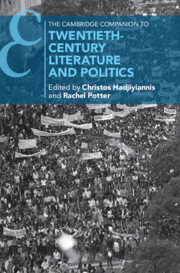Book contents
- The Cambridge Companion to Twentieth-Century Literature and Politics
- The Cambridge Companion to Twentieth-Century Literature and Politics
- Copyright page
- Contents
- Figures
- Notes on the Contributors
- Acknowledgements
- Chronology
- Introduction Literature and Politics
- Part I 1900–1945: Ideas and Governance
- Chapter 1 Liberalism
- Chapter 2 Communism
- Chapter 3 Fascism
- Chapter 4 Suffragism
- Chapter 5 Pacifism
- Part II 1945–1989: New Nations and New Frontiers
- Part III 1989–2000: Rights and Activisms
- Further Reading
- Index
- Cambridge Companions To …
Chapter 5 - Pacifism
from Part I - 1900–1945: Ideas and Governance
Published online by Cambridge University Press: 01 December 2022
- The Cambridge Companion to Twentieth-Century Literature and Politics
- The Cambridge Companion to Twentieth-Century Literature and Politics
- Copyright page
- Contents
- Figures
- Notes on the Contributors
- Acknowledgements
- Chronology
- Introduction Literature and Politics
- Part I 1900–1945: Ideas and Governance
- Chapter 1 Liberalism
- Chapter 2 Communism
- Chapter 3 Fascism
- Chapter 4 Suffragism
- Chapter 5 Pacifism
- Part II 1945–1989: New Nations and New Frontiers
- Part III 1989–2000: Rights and Activisms
- Further Reading
- Index
- Cambridge Companions To …
Summary
Pacifist activism flourished in Britain and America during the first half of the twentieth century, and peace was a central preoccupation for writers and intellectuals before and during both world wars. Vera Brittain, Bertrand Russell, George Orwell, Virginia Woolf, Storm Jameson, and Aldous Huxley were all actively engaged in some form of peace writing. This chapter examines this history in the British context, from the impact of conscription during the First World War to the grave challenges to peace of the 1930s. It investigates a variety of texts by conscientious objectors, peace campaigners, feminist pacifists, anti-war poets, public intellectuals, and internationalist reformers. This literary and political history reveals how the notion of peace shifted radically during this period. What began as a moral imperative – inherited from Christian teachings and the liberal legacy of the Enlightenment – was transformed into a secular notion with extensive political potential. As this chapter shows, pacifist thought underpinned arguments towards socio-political reform, and it shaped the language of rights central to political discourse after the Second World War.
Keywords
- Type
- Chapter
- Information
- Publisher: Cambridge University PressPrint publication year: 2022

